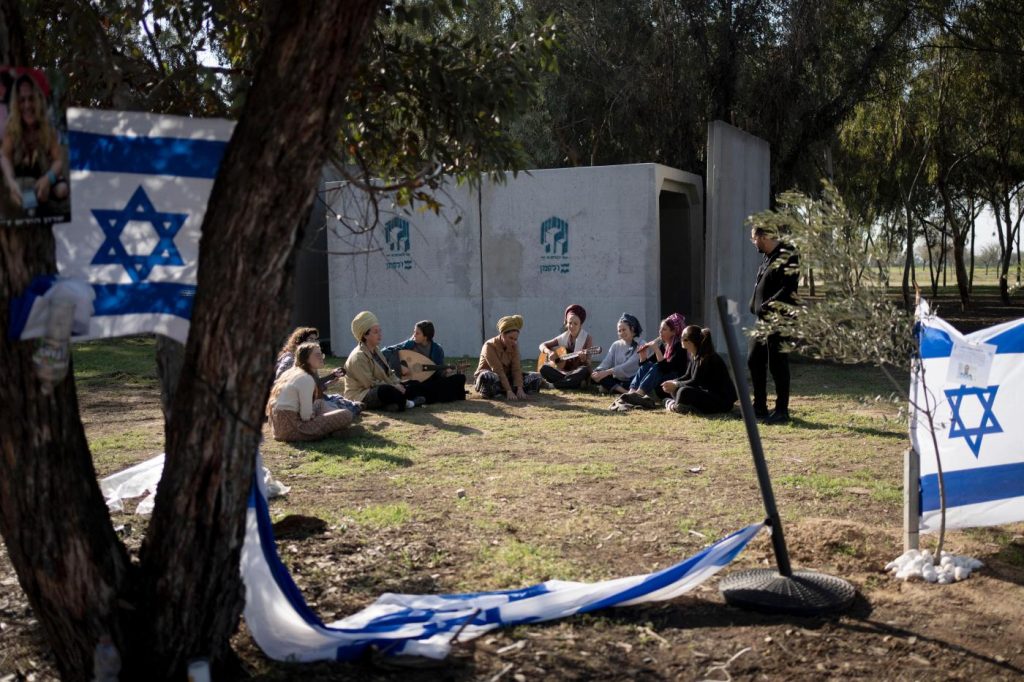There is a scene in “Screams Before Silence,” the harrowing documentary about the rape and mutilation of Israeli women on Oct. 7, that I can’t get out of my head. It’s an interview that former Facebook chief operating officer Sheryl Sandberg, the documentary’s presenter, conducted with Ayelet Levy Sachar, the mother of 19-year-old Naama Levy, whose kidnapping that morning was filmed by Hamas. The sight of her pajama bottoms, drenched in blood at the back, was one of the earliest indications that sexual brutality was part of Hamas’ playbook.
“They’re grabbing her by the hair, and she’s all, like, messed up, and like, and I’m thinking of her hair, and like, in my mind, I’m stroking her hair, like I’m always doing,” Levy Sachar said of the video of her daughter’s kidnapping. “We would like to think that this couldn’t be possible — that nobody would harm a young girl. But then you just see it there.”
To have a child seized, savaged and paraded this way goes beyond a parent’s worst nightmare. Here it is compounded by an additional horror: the combination of indifference and outright denial with which much of the world has treated these sexual atrocities.
Why? “People are so polarized that they want every fact to fit into a narrative, and if their narrative is resistance, then sexual violence doesn’t fit into that narrative,” Sandberg said when I met her in New York, hours before the documentary’s premiere at The Times Center. “You can believe that Gaza is happening because Israel has no choice; you can believe that Gaza is happening because Israel wants to kill babies. You can hold either one of those thoughts. And you should also be able to hold the thought that sexual violence is unacceptable, no matter what.”
Overpowering evidence
To watch “Screams Before Silence” is to be disabused of any lingering doubts about what Hamas did. The personal testimonies of victims, survivors and witnesses are clear and overpowering, as is the photographic evidence Sandberg was shown of mutilated corpses. And some of them have scarcely been heard about outside Israel.
There is Tali Binner, a partygoer at the Nova music festival who hid in a small camper as other women were raped outside: “I heard a girl that started to yell for a long time. It was like, ‘Please don’t. No, no, stop. Stop. Stop. Stop. No. No. No.’ It was like, she was asking someone to stop. What can they stop? Someone is abusing her. Someone touching her. Someone is doing something.”
There is Raz Cohen, who witnessed a rape as he hid with a friend in the brush: “Shoham, who was next to me, said, ‘He’s stabbing her. He’s slaughtering her,’ or something like that, and I didn’t want to look.” Cohen added, in Hebrew, “When I looked again, she was already dead, and he was still at it. He was still raping her after he had slaughtered her.”
There is Rami Davidian, who rushed to help people at the Nova site: “I saw girls tied up with their hands behind them to every tree here. Someone murdered them, raped them and abused them, here on these trees. Their legs were spread. Everyone who sees this knows right away that the girls were abused. Someone stripped them. Someone raped them. They inserted all kinds of things into their intimate organs, like wooden boards, iron rods. Over 30 girls were murdered and raped here.”
There is Amit Soussana, who was kidnapped to the Gaza Strip for 55 days and raped by her captor when she was trying to bathe: “He came toward me and just pointed a gun really hard at my forehead, screaming at me, ‘Take it off. Take it off,’ and punching me until I could not hold the towel anymore. And he started touching me, and I resisted, and then he dragged me to the bedroom. And then he forced me to commit a sexual act on him.”
The world turns away
Just to transcribe these quotations is awful. It may also seem gratuitous. But the refusal by so many people to acknowledge what happened, often accompanied by sneering derision, makes it necessary.
It also illustrates some important points about the rapes and mutilations.
One is that the sexual violence appears to have been by design. Terrorists engaged in gigantic killing sprees usually don’t have time to strip and rape their victims. Morgues don’t typically find body after body arriving with bloodied underpants, butchered breasts, mutilated groins. On Oct. 7 and the days that followed, they did, and not just in a few isolated incidents. How did so many of the killers get the same idea?
Another is that the primary purpose of the rapes was not sexual gratification. It was humiliation and terror. “When the body of the woman is violated, it symbolizes the body of the whole nation,” Ruth Halperin-Kaddari, a former vice president of the U.N. Committee on Elimination of Discrimination Against Women, observed to Sandberg. And what better way to terrify an enemy than through forms of sexual violence that make the rape scene in “A Clockwork Orange” seem tame by comparison?
Related Articles
Here’s what happened at UCLA before pro-Israel counterprotesters attacked pro-Palestinian protesters
Slow police response at violent UCLA protest under investigation
Cal Poly Humboldt closure still enforced after crackdown on protesters
Police start dismantling pro-Palestinian encampment at UCLA, some demonstrators detained
Photos: May Day Gaza protests in Oakland
A third point that goes beyond Israel: Sexual violence has always been a tool of war. But widespread awareness of it, along with an international determination to stop it, really started only in the 1990s with the horrors in the Balkans and Congo. The giant shrug with which the rape of Israeli women is being met suggests that time may be over. What starts with the Jews, as the saying goes, never ends with the Jews.
Which raises a final point.
“I’ve spent my life, obviously, building businesses,” Sandberg said toward the end of our interview. “And separately, I’ve spent a lot of my life fighting for women. And I never thought I was going to work on antisemitism. I didn’t think it was a problem, and I was absolutely wrong. And I never thought that politics could make any group or feminist leader turn a blind eye to just such clear documentation of sexual violence.”
With “Screams Before Silence,” Sandberg has screamed back at the silence. Is anybody listening?
Bret Stephens is a New York Times columnist.


